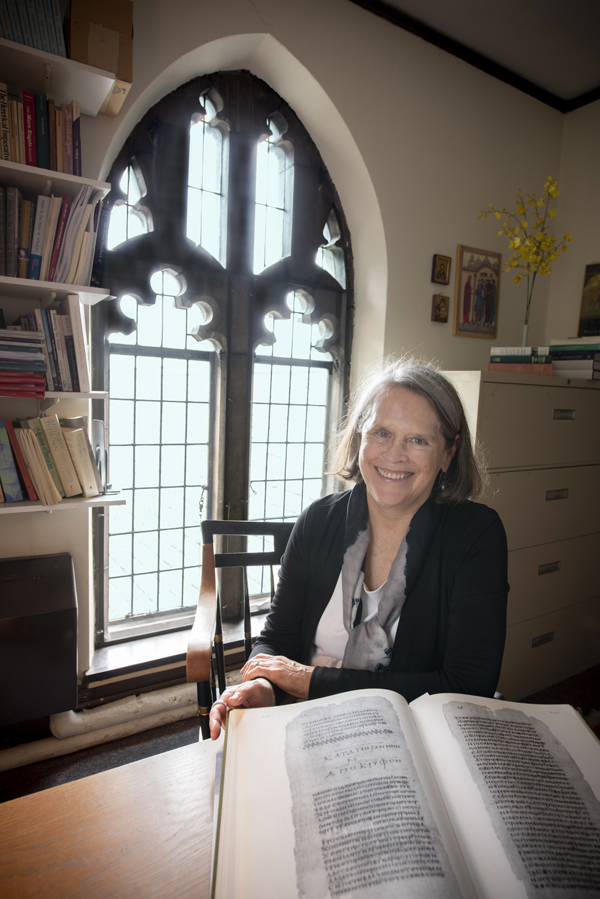- Editorial Offices
- 203 Brantly Hall
- Missoula, MT 59812
- (406) 243-2488
- themontanan@umontana.edu
Divine Scholarship
Karen King keeps the faith in the liberal arts at Harvard.
Growing up in the 1950s in a small town in south-western Montana, Karen L. King would ride a horse up into the mountains where she could get broader and more spectacular views of the landscape around her.
She brought that zest for adventure and new perspectives into her scholarship at the University of Montana, which would become the genesis of her academic career.
For the past 22 years she has taught at Harvard Divinity School. In 2009, King became the first woman appointed as Harvard’s Hollis Professor of Divinity, a position founded in 1721, making it the oldest endowed chair in the U.S.
As an expert on the history of early Christianity, focusing on newly discovered papyrus books from Egypt, King’s career represents all that is possible from a career in letters.
“I’m awfully proud of Karen, she has been very influential in the development of the study of early Christianity,” says Ray L. Hart, 91, King’s former adviser at UM, who co-founded the religious studies department in 1969.
Seated on the back porch of her home in Arlington, Massachusetts, about three miles from Harvard, King says that what her UM experience gave her was an unshakable belief in the value of a liberal arts education.
“I’m really grateful to the University of Montana,” says King, 65. “Those are the people and those are the programs that made my career possible.”
King hails from Sheridan, Montana, only a few miles from the historic gold-strike town of Virginia City, nestled in the wide-open Ruby Valley. Her family was Methodist, but she also went to Episcopal bible study, and her best friend was a Baptist. King’s father owned the town pharmacy, which was a community hub, and King worked there during summers. She loved to hike and to read, and she says her small town upbringing instilled the values of trust, neighborliness and honesty.
 Though she loved Montana, she also was eager to travel and see the wider world. She spent her last year of high school as an exchange student in Norway, and for college she enrolled in a small liberal arts school in Ohio that was the alma mater of the town doctor’s wife. King remembered brimming with “youthful idealism” that made her want to “save the world, do good, help people.” She wanted to become a doctor herself. When her college in Ohio closed after her freshman year, she returned to Montana and, wanting to continue her liberal arts education, enrolled at UM.
Though she loved Montana, she also was eager to travel and see the wider world. She spent her last year of high school as an exchange student in Norway, and for college she enrolled in a small liberal arts school in Ohio that was the alma mater of the town doctor’s wife. King remembered brimming with “youthful idealism” that made her want to “save the world, do good, help people.” She wanted to become a doctor herself. When her college in Ohio closed after her freshman year, she returned to Montana and, wanting to continue her liberal arts education, enrolled at UM.
Because she heard that medical schools like well-rounded applicants, she delved into UM’s fledgling religious studies department and became one of its first majors.
One of her classes was taught by a young man named John Turner who was studying recently unearthed documents that were filling important gaps in the story of how Christianity came to be.
At the time, Turner was deciphering what are known as the Nag Hammadi texts.
In 1945, a peasant farmer in northern Egypt near the town of Nag Hammadi discovered a buried earthenware jar. Inside were ancient leather-bound books containing previously unknown works written on papyrus, some of which may have been used as kindling. Fifty-two surviving texts from this trove made their way to the antiquities market of Cairo and eventually to an international team of specialists ̶ including faculty at UM.
Turner, 81, who teaches now at the University of Nebraska, remembers King as an, “energetic and ambitious young scholar.”
In his class, she read as-yet unpublished stories and traditions from the first three centuries of Christianity that, for whatever reasons, had not been included in the New Testament. The Nag Hammadi texts are among several important finds that provide riveting fresh new gospels and revelations.
Some portray Jesus’s teaching, rather than his crucifixion and resurrection, as the path to eternal salvation. Others portray God as Father-Mother or simply “the Good.”
Whether readers judge the newly discovered texts to be more akin to a divine director’s cut or ancient fan fiction, they expanded human knowledge about the culture during the budding of what became a dominant world religion. King feels it was an amazing gift that she got to be among the first to read through them, and not in Cairo, Berlin or Oxford, but in Montana (though eventually she would visit those faraway cities to examine the ancient papyrus for herself).
“There’s that sense of adventure, but intellectual adventure,” she says. “You sometimes read something and you have an attraction, or there’s a sparkle there and there’s an at-home sense.”
It was thrilling, she said, to have “the possibilities for thinking and living become larger.”
King’s experience at UM made her aspire to a different vocation than medicine, one which she pursued with the same ambition. She earned a doctorate degree at Brown University in Rhode Island and learned the Coptic language, the final version of ancient Egyptian written in the Greek alphabet, in order to read the new manuscripts in the original language. She won a fellowship from the West German government, and for 18 months she studied in Berlin, where, in the midst of the Cold War, she would cross the wall each week to meet with a leading scholar in East Berlin.
After graduating in 1984, she became a religious studies professor at Occidental College in Los Angeles. In 1997, she rose to a pinnacle in her profession by accepting a teaching position at Harvard. She has lectured across the U.S., as well as in Europe, Korea, Israel and Brazil. Over her 35-year career, she has written five books and over 50 articles about early Christianity. Her combined writings and lectures have illuminated more of the diverse, complex, and often overlooked voices from the origins of Christianity.
“Whether in research or teaching, my career has been about becoming clear on the questions,” says King. “I ask: What is the evidence, evidence of? What work is it doing? With what effects?
What is at stake? For whom? Why? These questions help us move from bare facts to conversations about ethics and truth, about people’s real lives and what kind of world we want to be part of building.”
Nathaniel Levtow, director of Global Humanities and Religions at UM’s College of Humanities and Sciences, says King’s career “reflects the excellence” of her education at UM. He called her “an inspiration to UM students exploring and pursuing degrees in the humanities today.”
Through her successes, she has learned the value of the lessons she gained from studying the humanities.
“They teach life skills, survival skills,” she says, “for living in our marvelous, perilous, complex world.”




